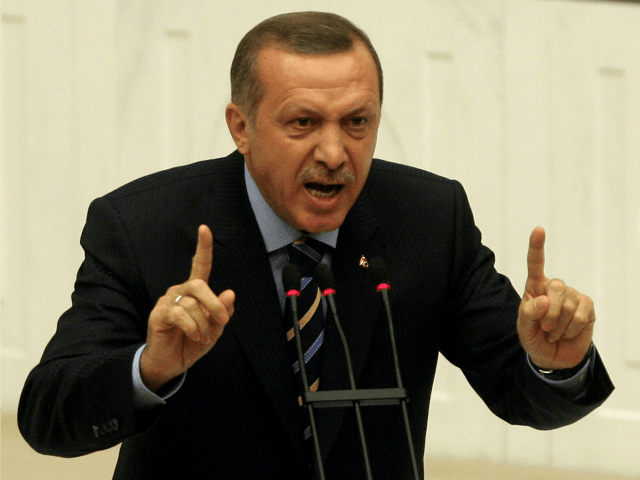Turkish President Recep Tayyip Erdogan has pledged to “soon” close its border crossings and airspace to the autonomous Kurdistan region in northern Iraq to retaliate against Kurds who overwhelmingly voted “yes” to independence last week.
“Now all the airspace is going to be closed. Flights have already been banned [by the central government in Baghdad]. Who is going to come? Who is going to leave?” Erdogan told a group of community leaders from Turkey’s predominantly Kurdish southeast region gathered in Ankara, according to Al-Monitor.
“Soon, the borders will also be closed,” he added, reports Hurriyet Daily News. “How will you be able to exit and enter?”
Erdogan directed his questions at Iraq’s Kurdistan Regional Government (KRG) President Massoud Barzani, once considered Erdogan’s ally, Al-Monitor points out.
Turkey has joined Shiite-led Baghdad, Iran, Syria, and other Middle Eastern countries in objecting to the independence vote the KRG held last Monday.
Iraqi Kurdistan’s neighbors oppose the region’s independence efforts because they fear it will fuel separatism among Kurds within their territory.
Turkey, in coordination with Baghdad and Iran, has threatened military action if the KRG does not cancel the outcome of the “yes” vote.
Erdogan has also renewed threats that Turkey will shut down a pipeline that brings Iraqi Kurdish oil to various countries.
He said Turkey, Iran, and Iraq would together decide the future of the flow of oil from northern Iraq.
His comments came after Russian President Vladimir Putin indicated that it is “not in anyone’s interest” for Turkey “to halt the Kurdistan Region’s oil exports,” reports Al-Monitor.
Erdogan said, “The increase in oil prices [from shutting down the KRG flow] would be better for Russia. Doesn’t Mr. Putin want oil prices to rise?”
Before the independence vote, the Kremlin said the Kurds have a “right” to declare independence, adding after the referendum that it was following a policy of “non-interference” in Iraqi Kurdish.
Meanwhile, referring to Iraqi Kurdistan’s independence, the Turkish president stressed:
Who gave you that right? Only Israel is supporting you. You have the former foreign minister of France [Bernard Kouchner] on one side and another Jew [Bernard-Henri Levy] on another, working at the table together. They are not your friends. They will be on your side today, they will disappear tomorrow. You will then look at us.
Israel is the only country in the Middle East that supports Kurdish independence.
Despite being on opposite sides of the Kurdish independence question and the Syrian war, Russia and Turkey have been trying to craft a solution to end the conflict in Syria.
Al-Monitor notes:
Over the past year, Russia has invested over $4 billion in the Kurdistan Region’s energy sector, overtaking the United States as the largest investor. By making such a commitment to northern Iraq, Putin was likely counting on both an eventual energy windfall and another card to play as a regional broker at the expense of the United States.
The United States opposes the establishment of a sovereign Kurdish nation.
Days before the September 25 Kurdish referendum, Russian-controlled oil company Rosneft announced another $1 billion investment in gas pipelines in Iraqi Kurdistan.
